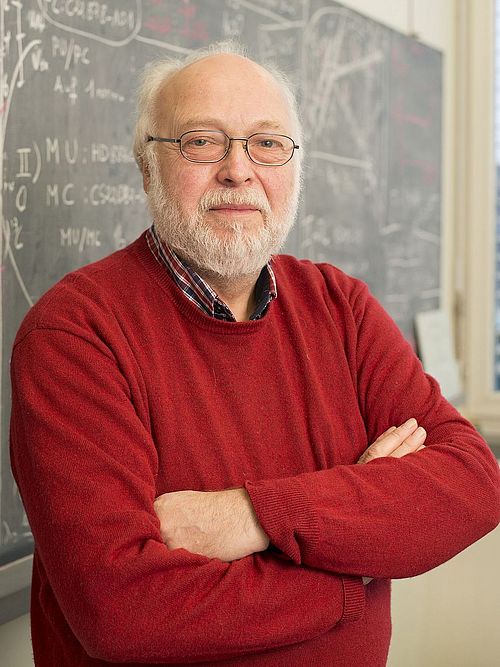
Prof. emer. F.-K. Thielemann
Professor emeritus of Theoretical Physics
Department of Physics
University of Basel
Klingelbergstr. 82
4056 Basel
Office 1.18
T +41 (0)61 207 3748
f-k.thielemann@clutterunibas.ch
Administrative assistant
Short Biography
Friedrich-Karl (Friedel) Thielemann, born 1951 in Mülheim/Ruhr (Germany), studied (theoretical) physics at the Technical University of Darmstadt (TUD), received his Ph.D. for studies in nuclear physics and its astrophysical applications (Max Planck Institute for Astrophysics, Garching and TUD) in 1980, held postdoctoral positions and extended research visits at the University of Chicago (with D.N. Schramm and W.D. Arnett), the California Institute of Technology (with Nobel Laureate Willy Fowler), the Max Planck Institute for Nuclear Physics (with H.V. Klapdor), the Max Planck Institute for Astrophysics (with W. Hillebrandt) and the University of Illinois (with J.W. Truran). In 1986 he was elected assistant professor, then associate prof. in 1991 at Harvard University (Harvard-Smithsonian Center for Astrophysics and Harvard Observatory). In 1994 he accepted the offer for a full professorship at the University of Basel. Presently he is also president of the platform MAP (Mathematics, Astronomy, Physics) of the Swiss Academy of Sciences and was the head of the Competence Center for Computational Sciences at the University of Basel until spring 2016.
Research Summary
The research groups of T. Rauscher, M. Liebendörfer and F.-K. Thielemann focus on theoretical and computational astrophysics as well as the subatomic processes which enter the modeling of hot and dense astrophysical plasmas. The latter include the broad field of Nuclear Astrophysics (nuclear and particle physics reactions, the highest density equation of state, properties of nuclei far from stability). This is applied to the big bang, the evolution of stars, compact objects (white dwarfs, neutron stars, black holes), explosive events (like novae, X-ray and Gamma-ray bursts, type Ia and core collapse supernovae, neutron star mergers and other collisions), leading often to the ejection of elements and isotopes originating from stable or explosive (nuclear) burning of matter or also the emission of gravitational waves. Astronomical Observers, experimental astro-particle physicists, or geo- and cosmochemists can provide constraints to test the results of such theoretical/computational modeling. The evolution of galaxies witnesses the cumulated input of the astrophysical sites listed above, can test the effect of individual objects, and especially the observation of «very-low metallicity stars» can test the very onset of the evolution of galaxies, starting initially with a composition resulting from the big bang.
Honors
- Otto Hahn Medal of the Max Planck Society (1979)
- Milton Fund Award, Harvard (1986)
- JSPS Fellowship (1992)
- Visiting professorship (Torino, 1995)
- Distinguished visiting scientist (Oak Ridge, 1997-2001)
- Elected Fellow of the American Physical Society (since 1998)
- GENCO Membership Award of the Exotic Nuclei Community (2007)
- Hans A. Bethe Prize of the American Physical Society (2008)
- Humboldt Research Award of the Alexander von Humboldt Foundation (2009)
- Lise Meitner Prize of the European Physical Society (2012)
- ERC Advanced Grant FISH «FaInt Supernovae and Hypernovae» (since 2013)
Selected Committee Memberships
- Editorial Boards of Review of Modern Physics (Associate Editor for Astrophysics since 2005) and Nuclear Physics A (since 1998)
- Board of Directors at ECT* Trento (2004-2007)
- Swiss Research Council (2005-2009)
- Swiss speaker of the International Graduate School Basel-Graz-Tübingen (2005-2010)
- Commission for Astronomy of the Swiss Academy of Sciences (2008-2016)
- Program Advisory Committee of the Extreme Matter Institute (EMMI), GSI Darmstadt, Germany (2009-2016)
- Program Committee of Eurocore Collaborative Research Programme EuroGENESIS (2009-2013)
- Program Advisory Committee for Experiments at RIKEN RI Beam Factory, RIKEN, Japan (2011-2015)
- Managing Committee of COST Action NewCompStar (since 2013)
- Advisory Committee of the Excellence Cluster Universe, Garching/Munich (since 2014)
- served also on advisory/review boards/committees for CERN-ISOLDE, TRIUMF, NuPECC, Oak Ridge and Argonne National Labs., the Helmholtz Society, and the Joint Institute for Nuclear Astrophysics (NSF)
Selected Publications
Beispiel einer automatisch generieren Literaturliste (Edoc)
Quick Links
